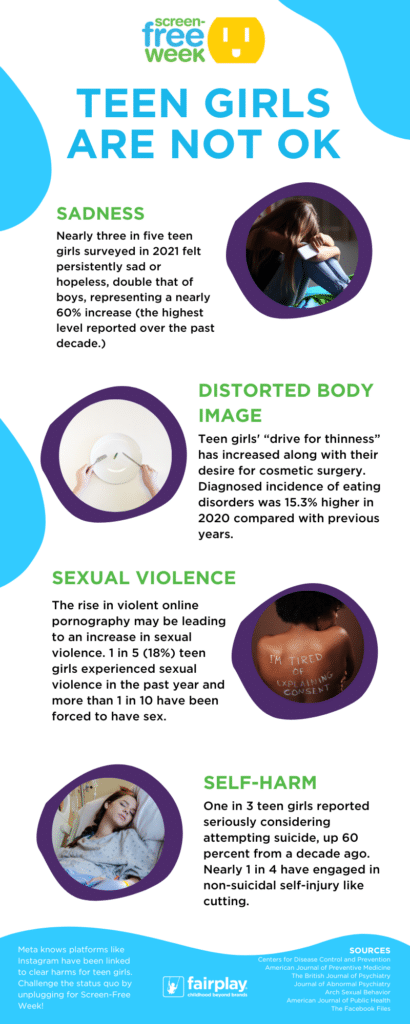
Why our daughters need Screen-Free Week
According to a recent CDC report, teen girls* today are experiencing record high levels of violence, sadness, and suicide risk, across all racial and ethnic groups.
As the parent of one, this has me deeply concerned.
I know all these problems aren’t solely caused by screen-time (I’m looking at you, pandemic), but there’s no denying it’s a factor exacerbating the situation.
As The American Psychiatric Association notes, “there is a growing consensus that the decline in [teen] mental health may be linked to the increasing popularity of smartphones and social media.”
This is particularly true for girls and young women who spend a lot of time on appearance-based social media sites (like Instagram, TikTok, Snapchat, etc.) As this article in The Atlantic explains:
Social media—particularly Instagram… “subjects their physical appearance to the hard metrics of likes and comment counts—takes the worst parts of middle school and glossy women’s magazines and intensifies them.”
So, what if, for young women (and young men, who are also struggling), Screen-Free Week wasn’t just about family game night, but something more?
What if you reframed this one week break from screens instead as a radical act of survival and self-care?
What would that look like?
It would mean starting your Screen-Free Week planning today.
(And also widening your frame of reference for “teen girls”—these conversations are appropriate for your middle schoolers, too. Death by suicide is the third leading cause of death in children ages 10–14.)
Talk about it
Start by having a conversation with your teen(s) about the CDC findings. (Most teens I’ve talked to never heard about it.)
Ask them…
- Does this data track with their own experience?
- Does this track with what they see and hear among their friends?
- Ask them to share more about their experience.
- Give them space to let pain into the light and examine it openly and empathetically, without judgment.
If you find that your teen in crisis right now, skip the rest of this post and seek immediate help by calling 988 or their doctor.
Identify the worst offenders
If your teen(s) is NOT in immediate crisis, ask them if there is a particular app, platform, or social network they find most problematic (most will be able to identify it in a heartbeat.)
Rather than just responding with, “Let’s delete it now!” (because many of them will un-delete it later), work together to brainstorm a triage plan for it.
How can you help them mitigate the damage it’s doing today?
- Can they turn off notifications?
- Can they unfollow some toxic accounts or contacts?
- Can they follow a bunch of new accounts that will bring some light and love into their feed?
Coach them on how to create a new normal within the platform itself.
Brainstorm a plan
Lastly, talk about how you and your teen(s) can work together to create a Screen-Free Week game plan to inoculate some of this pain with some radical self-care.
Radical self-care is about more than bubble baths, meditation crystals, and merely taking a break. It’s about make big, perhaps unpopluar shifts in your life to get unstuck and out of immediate danger.
- If Instagram makes them feel fat, how can you spend Screen-Free Week helping them feel beautiful again?
- If they feel like they’re never measuring up online, could you spend the week doing a family gratitude practice?
- If they’re finding it all too much, can you take the week to help them set up alternate communication channels between your teen(s) and their friends in other, less triggering platforms?
Basically, customize the Screen-Free Week “cure” so it matches the existing wound.
As Debra Houry, CDC’s Chief Medical Officer and Deputy Director for Program and Science says,
“High school should be a time for trailblazing, not trauma. Our kids need far more support to cope, hope, and thrive.”
That support starts with you. Let Screen-Free Week be your invitation to help your daughters(s) tackle the trauma and blaze a new trail.
*The stats are even worse for teen girls who are Queer. More than half (52%) of LGBQ+ students recently experienced poor mental health and more than 1 in 5 (22%) attempted suicide in the past year.



 Screen-Free Week gives us the extra push we need to reset our habits as we move into the warmer months. We are lucky in our community to have people who put together a lot of fun resources and activities for the week. Some they plan themselves and others they just help spread the word about.
Screen-Free Week gives us the extra push we need to reset our habits as we move into the warmer months. We are lucky in our community to have people who put together a lot of fun resources and activities for the week. Some they plan themselves and others they just help spread the word about.


